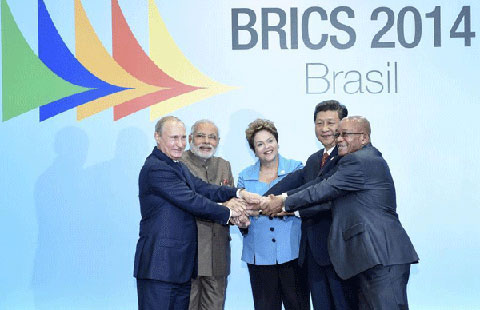
China, Cuba sign cooperation agreements during Xi's visit
Updated: 2014-07-23 15:50
By WU JIAO in Havana, and ZHANG YUNBI in Beijing (chinadaily.com.cn)
Comments Print Mail Large Medium Small
 |
|
Chinese President Xi Jinping (C) attends a welcoming ceremony held by Cuban President Raul Castro (1st L Front) in Havana, capital of Cuba, July 22, 2014. [Photo/Xinhua] |
China and Cuba on Tuesday signed an array of 29 cooperation agreements to support the Caribbean country's development and enhance bilateral ties as President Xi Jinping paid his first-ever state visit to Cuba.
Among the deals, China's Bank of Import and Export offered Cuba a 730 million RMB ($115 million) loan for Santiago Port, Cuba's second-largest port, to boost the country's infrastructure construction and facilitate better trade.
Under another deal, China Minmentals Cooperatiowill also be spending $600 million in buying Cuba nickel ore.
The two sides also agreed to cooperate in building a pilot agriculture park in Cuba, with the Chinese providing training.
An agriculture pact also was signed, with the two countries joining in studying and developing Moringa spp, a kind of plant popular in Cuba and southwest China noted for its nutrition and medical efforts.
Those deals were signed after Xi's talks with Cuban President Raul Castro, 83, at the Palace of the Revolution on Tuesday. The agreements cover economic and trade, agriculture, biotechnology, culture, education and other fields.
Xi arrived Monday night for his first state visit to Cuba, the last stop of his four-country Latin American trip.
Xi said that the leaders of the two countries would learn from experience in their bilateral relationship and chart the course for its future development.
With both nations now in a critical juncture for development, they face new important opportunities to grow their relations, he said upon arrival.
Raul Castro began instituting market-oriented reforms after taking over from ailing brother Fidel Castro in 2006.
This year, Cuba established its first Chinese-style special development zone and passed a more attractive foreign investment law that encourages investments from emerging markets such as Russia, China and Brazil.
The Chinese leader also paid a visit to retired revolutionary leader Fidel Castro, 88, who led Cuba for five decades. He stepped aside eight years ago because of health problems. Russian President Vladimir Putin visited with the elder statesman on a visit to Cuba 10 days ago.
On Wednesday, Xi will visit Santiago de Cuba, the country's second-largest city.
This is Xi's second visit within three years to Cuba since 2011, a move that shows "the great priority China has placed on its old friend Cuba", said former Chinese ambassador to Cuba Liu Yuqin.
Cuba is the first Latin American and Caribbean country that established diplomatic relations with the People's Republic of China in 1960.
Vice Foreign Minister Li Baodon, who oversees Latin American affairs, described the China-Cuba relationship as the one that "has withstood the test of the ups and downs of the international situation", and the two countries have become "good friends, good comrades and good brothers".
Xu Yicong, a researcher at the China Foundation for International Studies and former Chinese ambassador to Cuba, said the relationship "has entered the best era of all time" and the trip is "undertaking a mission of drafting the following episodes".
Bilateral trade has witnessed rapid growth in recent years, totaling around $2 billion each year.
Economic cooperation has gained ground between the two nations in fields such as agriculture, biotechnology and renewable energy.
Cuba is China's largest trade partner in the Caribbean region, while China has been the Cuba's second-largest trade partner since 2005.
"Chinese businesses should take such a good opportunity to make full use of the favorable geological conditions of Cuba and the friendly policies toward China in order to expand cooperation," Xu said.
Chinese Ambassador to Cuba Zhang Tuo noted that a growing number of Chinese entrepreneurs have shown great interest in investing in Cuba since new laws on investment and the Special Development Zone (SDZ) at Mariel port were enacted in Cuba earlier this year.
"We have received many inquiries from Chinese firms about how to invest in Cuba," Zhang told China Central Television in an interview.
Xu Shicheng, a senior research fellow on Latin American studies at the Chinese Academy of Social Sciences, said the new economic zone provides favorable policies, including tariff exemptions, which signals a good chance for Chinese enterprises.
The zone aims to attract foreign investment, boost infrastructure constructions, introduced cutting-edge technologies and improve employment, Xu said.
During his visit to Cuba, Xi will also pay a visit to Santiago, the second-largest city of the country.




